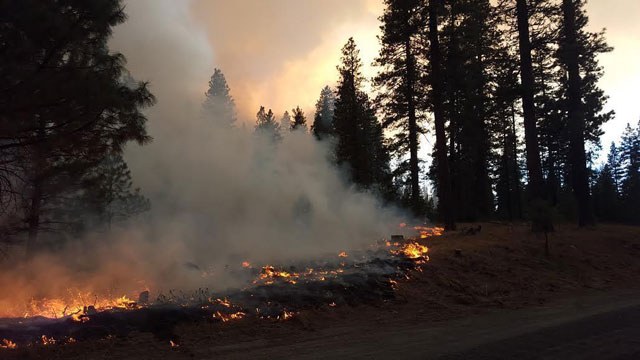How Trail Funding Works: How Can We Stop Fighting Fire With Recreation Budgets?
Wildfire spending has been eating up more of National Forest budgets, pulling from basic trail repairs. WTA and others are pushing Congress to fund better solutions.

As 2016 comes to a close, many of us are considering what our budgets for the new year will look like. But what if an item in your budget kept growing and growing each year? You would likely be faced with some hard choices about which other budget items you could transfer funds from.
That is the situation facing the United States Forest Service as the agency grapples with the need to increase spending on wildfire suppression and management at the same time that outdoor recreation use is increasing on forest lands. This challenge is made more complicated considering the total agency budget has remained relatively stagnant over the past 10 years.

When faced with the decision of saving funds for trail projects versus preventing forestland from being lost forever, it's easy to see why recreation funding has declined in recent years.
Recreation funding shrinks, imperiling access and rural economies
In 2015, the Forest Service transferred recreation funds in its own budget to cover fire-related expenses for the eighth time since 2002.
“Once again we have to shut down many parts of our mission to fulfill our wildfire suppression responsibilities within the funds available to the agency,” Forest Service Chief Tom Tidwell wrote in a memo at the time.
Some fires contribute to overall forest health, but a changing climate means fires are burning hotter and broader than before.
Luckily, the 2016 fire season was relatively mild compared to 2015. This did not mean that this year bucked funding trends, however. According to Gary Paull, Wilderness and Trails Program Coordinator for the Mt. Baker-Snoqualmie National Forest, increased fire spending has reduced funding in other program areas like recreation. This has had a significant impact to staffing on the forest.
According to Paull, flat or declining recreation budgets have meant trail coordinator positions in the Enumclaw, Darrington and Mount Baker Ranger Districts have been cut and will not be filled in the foreseeable future. Paull said this means fewer resources for trail projects because these trail coordinators were bringing in new grant dollars for their districts. Trail coordinators also managed volunteers working on the forest.
Fire spending nearly equaled non-fire spending on National Forest lands this year. Fire spending is projected to require twice as much of the budget by 2025 if current trends continue.
In practice, this means hikers and other outdoor enthusiasts can expect delays on other projects like construction of new trails, trail repairs, replacing trail signage and basic maintenance to trailhead facilities and campsites. If these kinds of infrastructure decline, this could cause reduced visitation to trails on National Forest lands and decreased spending at locally-owned businesses that rely on the outdoor recreation economy.
Washington state is home to six National Forests and a $22 billion recreation economy.
Outdoor groups ask Congress to fund proactive solutions
So, what's next?
We're back to the beginning of the process: Congress and the president need to make a budget for fiscal year 2018 (which has technically already begun due to how the federal budget calendar is written).
While many in the outdoor recreation community hoped Congress would use the recent lame duck session to pass a national budget and find a solution to fire spending, elected leaders went home before either goal could be achieved.
Before D.C. closed up shop for the year, 129 outdoor organizations sent a letter to Congress urging leaders to find a solution to the problem. Signers included WTA, along with businesses, organizations and agencies like the Washington Department of Fish and Wildlife, The Trust for Public Land, the Outdoor Industry Association and The Mountaineers.
Some of the solutions proposed in the letter included:
- Increasing agency budgets
- Using disaster funding to offset extraordinary wildfire costs
- Preventing agencies from being forced to raid other funds in the first place
A sustainable solution to this problem will require proactive management. We build retaining walls to prevent erosion on trails and make sure trails are constructed in a way that protects drinking water. Similarly, we must proactively manage forest lands to prevent catastrophic wildfires while funding recreation infrastructure at the same time so these places can continue to be enjoyed by future generations.


Comments
Fire
One thing we need to do is stop accepting line that fire destroys forest forever. Only a few fires occur in ancient forests such as recent one on the east end of the Queets. Most are in land with a more common fire return. The local Wyoming politicians talked like this during the Yellowstone fires of 1988. Tourism went up. The park is gorgeous.
Posted by:
Olywa on Dec 26, 2016 06:38 PM
cthompson_wta on How Trail Funding Works: How Can We Stop Fighting Fire With Recreation Budgets?
minor correction: it's the U.S. Forest Service, not the National Forest Service. The USFS manages National Forests.
I know this is an old article, but I wanted to point this out because WTA is a very influential organization, and for the purposes of user education, it's super important that WTA disseminate accurate information about land-management agencies.
Referring to the USFS as the "National" Forest Service contributes to confusion between the USFS and NPS (National Parks). The two organizations manage land very differently, and the more users can be made aware of the differences in management of the places in which they like to recreate, the better advocates and stewards they can be.
As a group that works very closely with land-management agencies, I think WTA should make spreading accurate information about those agencies a priority, and I'm surprised this minor error wasn't caught before this article was published.
Thanks for hearing me out!
Posted by:
cthompson_wta on Feb 09, 2021 04:29 PM